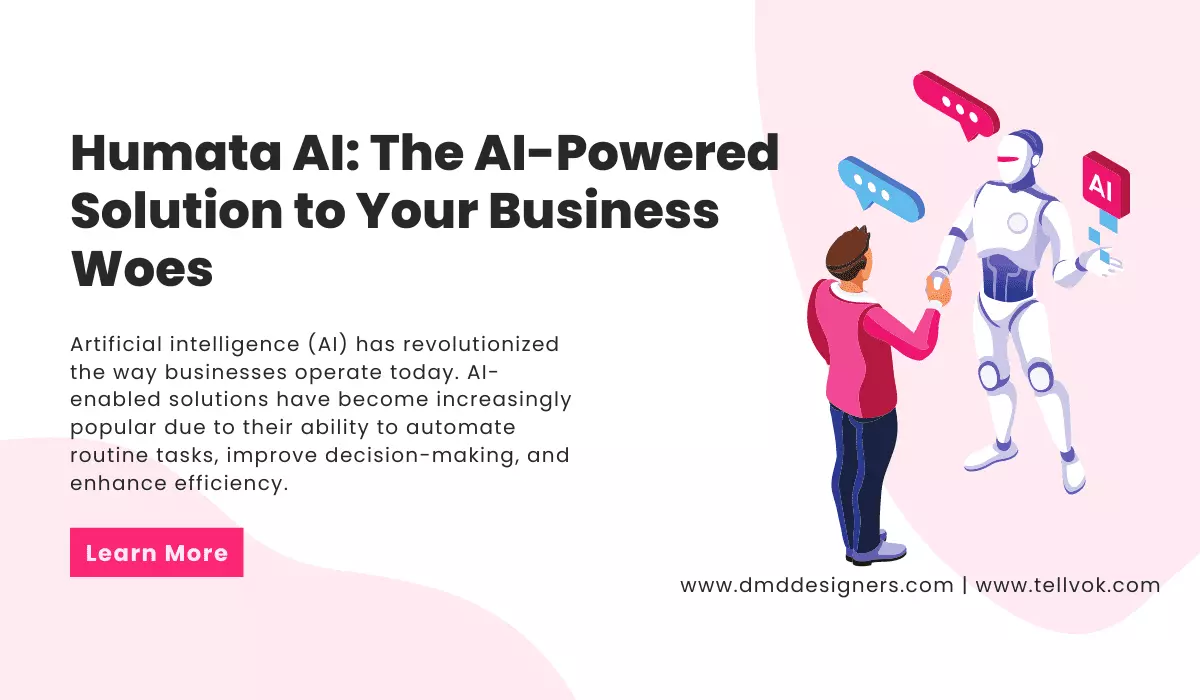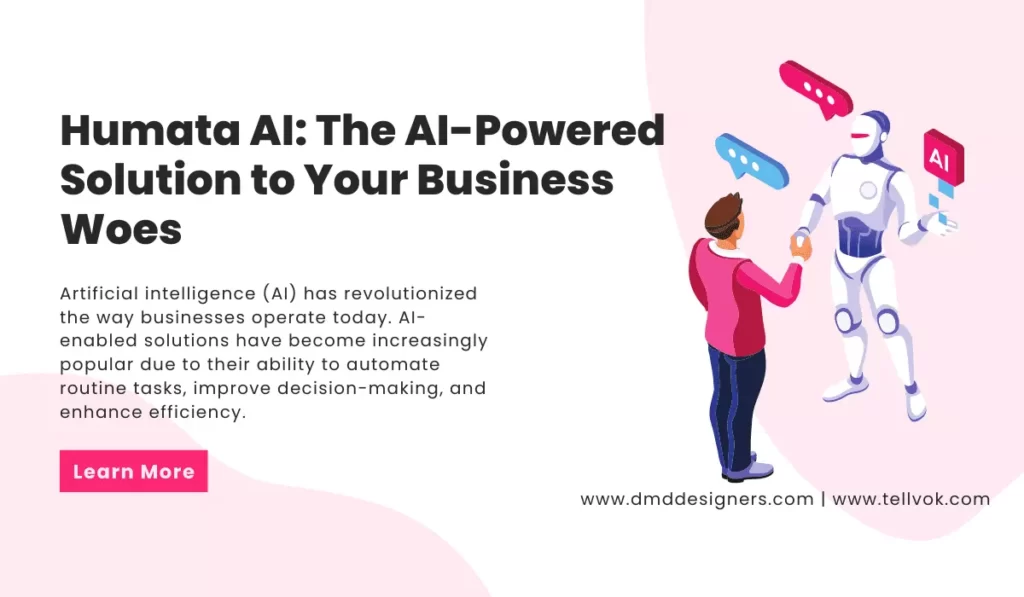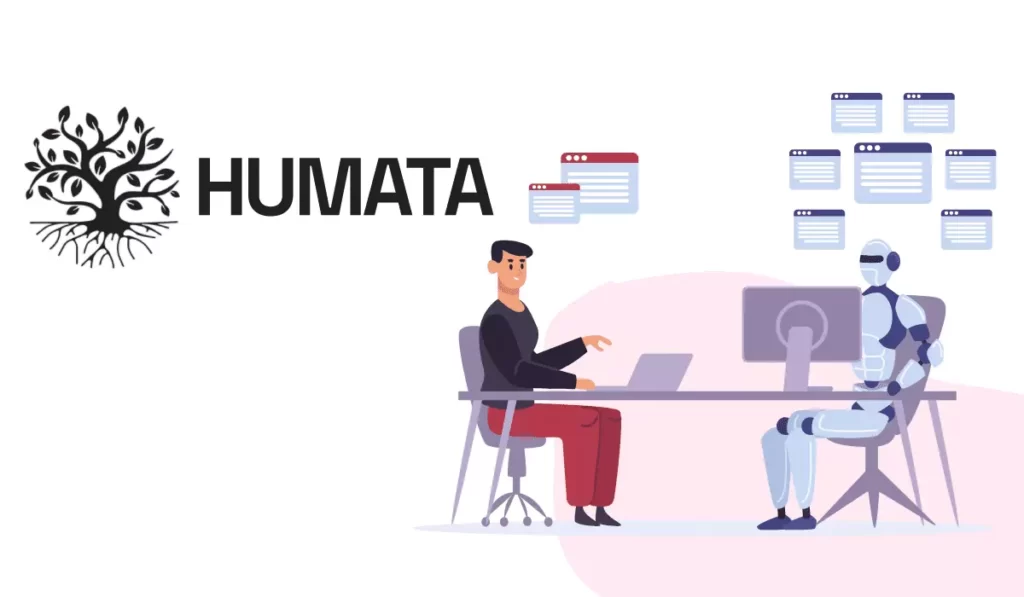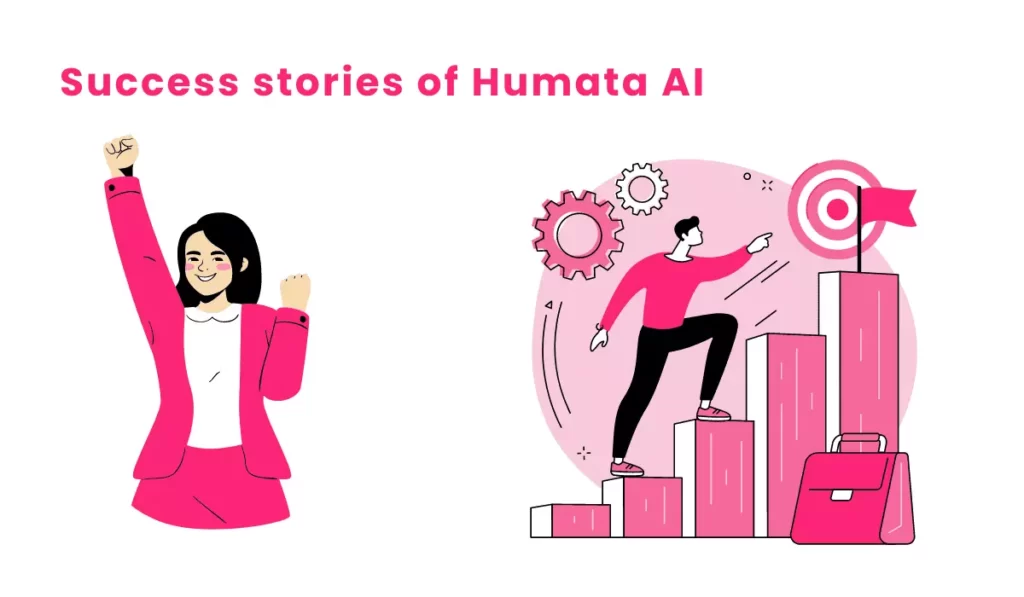
Humata AI: The AI-Powered Solution to Your Business Woes

Artificial intelligence (AI) has revolutionized the way businesses operate today. Humata AI -enabled solutions have become increasingly popular due to their ability to automate routine tasks, improve decision-making, and enhance efficiency. Humata AI is one such solution that offers a range of business benefits. In this essay, we will explore the features, advantages, and potential risks of Humata . We will also provide case studies and compare Humata with other AI-powered solutions to help you understand why it could be a game-changer for your business.
Table Of Content
- AI-enabled solutions
- What is Humata AI?
- Is Humata AI free?
- How does Humata AI work?
- Advantages of Humata AI
- Use cases of Humata AI
- Sales and Marketing
- Customer Support
- HR Management
- Financial Analysis
- Implementing Humata AI
- Identifying Business Needs
- Integration with Existing Processes
- Training and Testing
- Benefits of Humata AI
- Potential Risks and Challenges
- Privacy Concerns
- Integration Problems
- Technical Difficulties
- Future of Humata AI
- Success stories of Humata AI
- Company A
- Company B
- Company C
- Comparing Humata AI with Other AI-Powered Solutions
- Humata AI vs. Chatbots
- Humata vs. RPA
- Humata AI vs. Human Workforce
- Barriers to Implementing Humata AI
- Lack of Awareness and Education
- Resistance to Change
- Skills Gap
- Case Study: Implementation of Humata AI
- Company D
- Challenges Faced
- Results Achieved
- Benefits of Investing in Humata AI
- Conclusion
- Frequently Asked Questions
AI-enabled solutions
Artificial intelligence has the potential to offer businesses a wide range of advantages. By automating routine tasks, streamlining processes, and improving decision-making capabilities, AI can help businesses improve their operational efficiency and reduce costs. AI-enabled solutions can be classified into three categories: Chatbots, Robotic Process Automation (RPA), and AI-powered automation.
What is Humata AI?
It is an AI-powered solution that offers a range of benefits to businesses. It is a platform that uses machine learning and natural language processing to automate routine tasks and improve decision-making. Humata can be used in various departments such as sales and marketing, customer support, HR management, and financial analysis.
Is Humata AI free?
Tool offers a range of pricing plans, each with different features. The basic plan is free, while the premium plans come with additional features and support.
How does Humata AI work?

This AI uses machine learning and natural language processing to understand user inputs and respond with relevant answers. It can be integrated into various platforms such as Slack and Microsoft Teams, making it easier for businesses to use it as part of their existing processes.
Advantages of Humata AI

Humata AI offers the following advantages:
- Improved efficiency
- Cost savings
- Improved workflows
- Better decision-making capabilities
- Increased customer satisfaction
Use cases of Humata AI
Tool AI can be used in various departments:
Sales and Marketing
This Ai can be used to automate routine tasks such as prospecting, lead generation, and lead nurturing. It can also be used to improve customer engagement by responding to customer queries and feedback in real-time.
Customer Support
Ai can be used to improve customer support by providing real-time assistance to customers. It can also be used to automate routine tasks such as ticket logging and follow-ups.
HR Management
Website can be used to automate routine HR tasks such as recruitment, onboarding, and performance management. It can also be used to provide real-time assistance to employees with their inquiries and feedback.
Financial Analysis
It can be used to automate routine financial tasks such as data entry, financial reporting, and risk management. It can also be used to provide real-time financial insights to the management team.
Implementing Humata AI
Implementing Humata requires the following steps:
Identifying Business Needs
Businesses need to identify their pain points and determine how Humata AI can help address them.
Integration with Existing Processes
Humata needs to be integrated into existing processes to ensure smooth operations.
Training and Testing
Employees need to be trained on the use of Humata, and testing needs to be carried out to ensure that it works as expected.
Benefits of Humata AI
Humata AI offers the following benefits:
- Increased Efficiency: Humata can automate routine tasks, freeing up employees’ time to focus on higher-value tasks.
- Cost Savings: Humata can help businesses save costs by eliminating the need for additional employees or outsourcing of routine tasks.
- Improved Workflows: Humata can streamline workflows and improve the speed and quality of work.
- Better Decision-making: Humata can provide real-time insights that can help businesses make better decisions.
Potential Risks and Challenges
Humata AI also poses some risks and challenges:
Privacy Concerns
Humata relies on customer data to provide relevant responses, which can raise privacy concerns.
Integration Problems
Integrating Humata with existing processes can be a challenging task, requiring technical expertise.
Technical Difficulties
Humata requires regular updates, which can lead to technical difficulties if not managed properly.
Future of Humata AI
The future of Humata AI looks bright, with advancements in AI technology and integration with other technologies predicted to drive its growth.
Success stories of Humata AI

Here are some success stories of businesses that have implemented Humata AI:
Company A
Company A implemented Humata in their customer support department, which led to a significant increase in customer satisfaction ratings.
Company B
Company B implemented Humata in their financial analysis department, which led to improved financial reporting and better decision-making capabilities.
Company C
Company C implemented Humata in their sales and marketing department, which led to a significant increase in lead generation and conversion rates.
Comparing Humata AI with Other AI-Powered Solutions
Humata AI can be compared with other AI-powered solutions:
Humata AI vs. Chatbots
Humata can offer more sophisticated responses than chatbots, due to its machine learning capabilities.
Humata vs. RPA
Humata offers more flexibility than RPA, due to its natural language processing capabilities.
Humata AI vs. Human Workforce
Humata can automate routine tasks, freeing up employees to focus on higher-value tasks.
Barriers to Implementing Humata AI
Implementing Humata AI can be challenging due to the following factors:
Lack of Awareness and Education
Businesses may not be aware of the capabilities of Humata, leading to resistance to change.
Resistance to Change
Employees may be resistant to change, particularly if they feel that Humata threatens their job security.
Skills Gap
Implementing Humata requires technical expertise, which may not be available in-house.
Case Study: Implementation of Humata AI
Company D
Company D implemented Humata AI in their HR department, which led to improved efficiency and reduced costs.
Challenges Faced
Company D faced integration problems and resistance to change from some of its employees.
Results Achieved
Company D achieved improved HR management and increased employee satisfaction ratings.
Benefits of Investing in Humata AI
Investing in Humata AI can offer businesses the following benefits:
- Improved Customer Satisfaction: Humata can provide real-time assistance to customers, leading to increased satisfaction ratings.
- Increased Revenue: Humata can improve lead generation and conversion rates, leading to increased revenue.
- Competitive Advantage: Humata can provide businesses with a competitive advantage by automating routine tasks and improving operational efficiency.
Conclusion
Humata AI is an AI-powered solution that offers a range of benefits to businesses. By automating routine tasks, improving decision-making capabilities, and enhancing efficiency, Humata AI can help businesses improve their operational efficiency and reduce costs. Although there are potential risks and challenges associated with implementing Humata AI, the benefits outweigh the drawbacks. Additionally, the future of Humata AI looks promising, with advancements in AI technology predicted to drive its growth.
Frequently Asked Questions
Humata AI offers a range of pricing plans, with the basic plan being free.
The implementation time depends on the complexity of the business processes that need to be automated.
Yes, Humata AI can be customized to meet the specific needs of businesses.
Yes, Humata AI requires technical expertise to install, configure, and customize.
Please share this article if you like it!




No Comment! Be the first one.